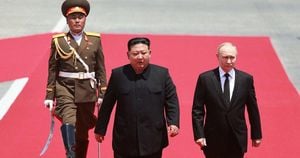Japan's pursuit of space dominance has faced several challenges, culminating recently in the setback of their lunar exploration program. The Japan Aerospace Exploration Agency (JAXA) had ambitious plans to launch the H-II Transfer Vehicle (HTV) mission to supply resources to the International Space Station (ISS) and also bring back data related to lunar activity, but encountered unexpected technical difficulties.
Initially, plans were set for the HTV to assist with the construction of lunar bases, supporting missions to the moon and possibly beyond, with aspirations for future Mars exploration. These plans, informed by earlier successful missions, sought to leverage Japan’s strong technological base and mission experience. But the latest delay has raised eyebrows and prompted discussions about the viability of Japan’s aerospace ambitions.
Since 2021, JAXA has repeatedly altered its schedule for the lunar missions, citing various technical issues and performance setbacks. For the most recent delay, officials indicated they needed more time to solve the engine-related problems facing their rockets before proceeding forward with their missions. This has spurred criticism over the project management and development processes at JAXA, as stakeholders stress the importance of maintaining transparency and accountability within their operations.
Even as these issues loom, experts remind us of the progress already made by Japan's space agency. Through successful launches of Mars probes and scientific satellites, Japan has positioned itself as a key player on the global stage. The desire to establish lunar bases has only amplified Japan's standing, especially as nations like the United States and China advance their own lunar explorations. JAXA Administrator Hiroshi Yamakawa believes Japan can contribute significantly to international efforts.
"We aim to create partnerships with other nations to deliver advanced technology for safer lunar landings, as well as science experiments to gather more information about the lunar surface and what resources it can provide," Yamakawa mentioned during the last exploratory project briefing.
Japan’s setbacks have led to doubts among the public about their preparedness for future missions. Despite this, supporters continue to highlight JAXA’s precision engineering as being integral to their projects. Each challenge faced is seen as part of the developmental process, and experts are still optimistic about Japan's eventual success. They stress the importance of adhering to engineering truths rather than rushing to meet deadlines, citing the risks associated with unproven technology compounded by the extreme environment of space.
The JAXA moon lander project, dubbed SLIM (Smart Lander for Investigative Mission), has been one of the agency’s highlights. Intended to land on the lunar surface using incredibly precise techniques, SLIM’s development brims with promise. The focus on achieving accurate lunar landings, which have eluded many nations, beckons excitement.
Another significant effort, the Lunar Polar Exploration mission, remains slated for the future. Targeting water deposits at the lunar poles, this mission highlights Japan’s long-term vision of enhancing human presence on the moon. It takes multiple steps and requires exquisite coordination with various international agencies to achieve shared goals.
While domestic funding has increased, allowing for consistent investments, alongside public interest remaining strong, the Japanese space agency must clear the technical hurdles standing before them. Choosing to focus on smaller satellite missions has also been floated as a strategy for maintaining momentum amid these larger challenges.
Long-held dreams of tapping moon resources, along with the allure of developing technologies to support Martian colonization, still captivate JAXA's leadership. Their recent setback has fueled discussions on the pathways forward, with leaders emphasizing the necessity for adaptive strategies and potentially re-envisioning timelines.
Finally, recent reports echo how the delays might redefine Japan's role among space-faring nations. Observers note how collaborations can evolve outside of what was initially scoped. With remarks from industry professionals pointing to favorable shifts, other countries recognize the benefits of pooling resources and expertise across nations.
The future remains uncertain, yet analysis of previous explorations suggests Japan still has the adaptability and innovation necessary to rebound. Their dedication to problem-solving and engineering excellence may very well carry them through this tumultuous period, allowing them to emerge more resilient than before.
While the setbacks present challenges, they also contain the seeds for future success. The question remains — will Japan bounce back and redefine its path for exploration, or will delays continue to hinder its lunar ambitions? Time will surely tell as the world watches their progress.



